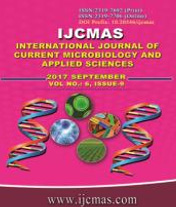


 National Academy of Agricultural Sciences (NAAS)
National Academy of Agricultural Sciences (NAAS)

|
PRINT ISSN : 2319-7692
Online ISSN : 2319-7706 Issues : 12 per year Publisher : Excellent Publishers Email : editorijcmas@gmail.com / submit@ijcmas.com Editor-in-chief: Dr.M.Prakash Index Copernicus ICV 2018: 95.39 NAAS RATING 2020: 5.38 |
When exposed to stressful conditions, plants accumulate an array of metabolites, particularly amino acids. Amino acids have traditionally been considered as precursors to and constituents of proteins, and play an important role in plant metabolism and development. A large body of data suggests a positive correlation between proline and glycine betaine (GB), accumulation and plant stress. Proline, an amino acid plays three major roles during stress, i.e., as a metal chelator, an antioxidative defense molecule and a signaling molecule and glycine betaine (GB), an amphoteric quaternary amine, plays a highly beneficial role in plants exposed to various stress conditions such as high levels of salts and low temperature. Review of the literature indicates that a stressful environment results in an overproduction of proline and glycine betaine in plants which in turn imparts stress tolerance by maintaining cell turgor or osmotic balance; stabilizing membranes thereby preventing electrolyte leakage; and bringing concentrations of reactive oxygen species (ROS) within normal ranges, thus preventing oxidative burst in plants. The roles played by exogenous proline and glycine betaine under varying environments have been critically examined and reviewed.
 |
 |
 |
 |
 |